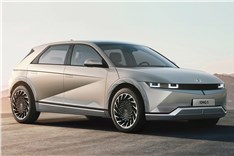Hyundai Ioniq 5 long term review, 19,500km report
Second report: Can this EV handle a typical weekend getaway without the need to recharge?
Published on Nov 30, 2024 07:30:00 AM
22,875 Views
Follow us on

Camera quality in low light conditions is poor.
Because the Hyundai Ioniq 5 is similar in size to a Tata Harrier, it is too big for my cramped residential parking space, which means I can’t use it as a daily driver. So, ever since this EV entered the Autocar India long term fleet, I’ve been yearning to spend time with it. And after many months, I finally got an opportunity – a weekend getaway to Aamby Valley City, a holiday township, located around 125km away from Mumbai. Since I’ve tested this Hyundai EV extensively, its combined range of 457km made me very confident that the Ioniq 5’s battery would have enough juice for the round trip and still be left with sufficient charge.
“It looks futuristic. Nice colour. It is so spacious.” These were some of the remarks by my wife and friends, who were totally blown away by the Ioniq 5. With a fully charged battery, a boot full of luggage, and three very excited passengers, we set off. Since the intent wasn’t to maximise range, I drove in ‘Normal’ mode for the most part, and switched to ‘Sport’ mode on a few occasions. The state of charge (SoC) dropped at a gradual pace on smooth highways; however, it was the 40 kilometres of the hilly roads that took a heavier toll on its battery. By the time we reached our destination, battery level had dropped to 48 percent. This was possibly the first time I second-guessed my belief in its range.

Throughout our drive, my passengers couldn’t stop praising the sheer space available, its seat comfort, and even its enormous glass roof. They also utilised the multiple storage areas to stow snacks, chocolates and beverages, and the area beneath the front central armrest is so large that it easily swallowed a handbag. An episode of a sudden downpour, which left us drenched in minutes, also made us understand and appreciate the importance of heated front and rear seats. Rear passengers, however, were quick to highlight the soft music volume from the rear speakers, a complaint many Hyundai owners have with their Bose audio systems. Also, I discovered that in low light, rainy conditions, its 360-degree camera display is almost unusable.
Over the two days we spent in Aamby Valley City, we drove within the township a fair bit. And the SoC fell by another 10 percent. I would be lying if I said that range anxiety hadn’t kicked in while exiting Aamby Valley’s gate on the way back home, but since our return journey involved a fair bit of downhill driving, I was hopeful that we’d still make it with enough charge left.

With no wireless Android Auto on offer (only wired), my phone was connected to the car’s infotainment via Bluetooth, so I hadn’t checked traffic or the estimated arrival time on Google Maps before leaving. Who knew this negligence on my part was going to be the biggest mistake of our trip?
None of us anticipated the heavy influx of tourists, merely a few kilometres away from Aamby Valley. Visitors had flocked to witness the Karvi flowers, which bloom once every seven or eight years and cover the hills of the western ghats in a spectacular blueish-purple blanket. As a result, the narrow two-lane road was jam-packed. Vehicles were parked haphazardly, cars had broken down, and all the usual chaos caused due to the indiscipline and callousness of road users had resulted in traffic coming to a grinding halt. So bad was the jam that there was a point where we were stuck in the same spot for a little over 2 hours. Furthermore, it took us a nightmarish 5 hours to cover a distance of 25km (Aamby Valley city to Lonavala). No kidding!

Mercifully, we were in the lap of luxury, sitting in the comfort of an air-conditioned cabin, with ventilated seats on and the music playing; the best part was that all this didn’t have a drastic effect on the battery either. Once the road opened up, the same uphill ghat which sapped battery power, helped conserve energy with the help of regenerative braking on the way down, and the SoC had barely dropped by 5 percent, to 33 percent, in the 6.5 hours it took to reach the flat section of the Pune-Mumbai expressway.
The remainder of our journey was uneventful. We reached Mumbai after covering a total distance of 342km, with 15 percent SoC and still an estimated range of 67km to spare. This means that despite the thick traffic jam and the steep ghat sections, the Ioniq 5 is easily capable of delivering 400km of highway range on a single charge, that too rather effortlessly.

After living with the car and gathering opinions and comments from friends and family, I can conclude that this Hyundai isn’t for those seeking snob value, which German marques exert at this price point. But look beyond its badge and the Ioniq 5 is genuinely a fantastic, well-rounded and luxurious car that happens to be an EV; one that I’ll wholehartedly recommend this side of Rs 1 crore.
Copyright (c) Autocar India. All rights reserved.








Comments
Member Login
Personal Details
No comments yet. Be the first to comment.